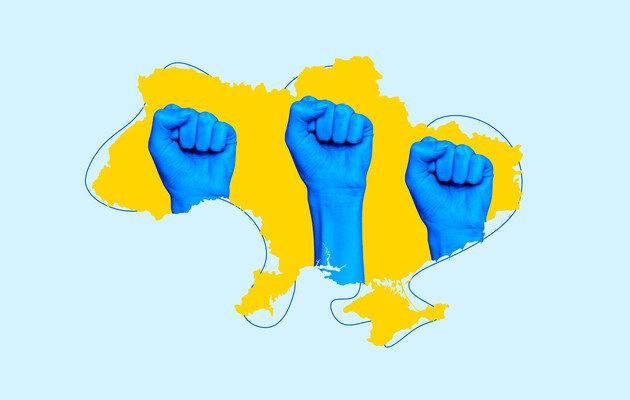Will Ukrainians accept the usurpation of power?
First, a few historical analogies, because how can we do without them.
Street photographers used to have these painted plywood sets with holes cut out for their faces. They are still there. You insert your happy face there, then you smile stupidly at the photographer's request, and voila, you appear in the photo like a princess, a prince or a horse in a spherical vacuum.
It is in this way, with silly smiles or tragic grimaces, that we constantly insert ourselves and our political leaders into some historical analogies. Although written history is still those plywood coloring pages. Whose political leaders are in power is the one who sets the scenery.
On November 9, 1799 (18 Brumaire according to the revolutionary calendar), a small detachment of grenadiers marched to the sound of drums to the Paris building "Luxembourg", where the deputies of the two chambers of the Legislative Council were sitting. Napoleon's ally, General Murat, ordered the troops to clear the premises and dissolve the Parliament of the Directory.
A moment ago, the crowd was trying to tear the Corsican brat to shreds. But in the presence of soldiers, only a few of such desperate and brave people remained. The "Decree on Public Safety and Constitutionality" was read to loyal citizens. They said that it was time, because the unfinished Jacobins were preparing revenge and the republic was in danger. Meanwhile, the unfinished French monarchists watched this revolutionary circus with interest, but from the opposite, safe side of the English Channel.
There were three requirements in the decree, which are completely understandable to us, and are still acceptable today:
1) Dissolution of the parliament due to corruption and incompetence.
2) Creation of a fundamentally new executive body.
3) Restoration of order and stability.
Around two o'clock in the morning, the council of elders and some specially invited members of parliament approved the necessary changes to the Constitution. A new government was formed, headed by three consuls: Napoleon Bonaparte, Joseph Sieyès and Roger Ducos.
In five years and six months, First Consul Napoleon would become emperor.
At the time of the dissolution of the parliament, ten years had passed since the beginning of the Great French Revolution (the main ideals of which are still prayed to by all supporters of the left movement around the world).
During this time, the revolutionary French government in the format of the Directory turned into a disgusting corrupt and greedy structure, absorbed in career intrigues.
Five years and 13 days after the storming of the Bastille, the revolutionaries carried out (of course, exclusively under revolutionary slogans) their first, Coup d'état of 9 Thermidor. Maximilien François Marie Isidore de Robespierre, Jean-Paul Marat, Louis Antoine Léon de Saint-Just, Georges Jacques Danton, François-Noël Babeuf and other romantic scoundrels, singers of terror and the rights of man and citizen were sent to the guillotine (16 thousand executed aristocrats and priests were not considered people and citizens). By the way, the Declaration of the Rights of Man and Citizen was adopted under King Louis XVI. It was such a short apotheosis of national unity in them – the king was executed in four years.
No one called these ancient French "Dzerzhinsky" usurpers. Because in the revolution every citizen is his own leader, hero and executioner.
The label of the usurper was attached to Napoleon by the monarchical regimes of that time. And I wouldn't say that it's undeserved. His personality was not so glorious and flawless. But Napoleon's political entourage shrank and faded away in ten years.
A talented person with a strong character and, most importantly, a good knowledge of artillery against this background looked like a genius and the chosen one of fate.
When talking about historical usurping characters, in this Napoleonic tradition, too much attention is paid to their personal qualities. This creates a cult, but does not explain the phenomenon.
Because if you pay attention to what and why happened in another country, in which the usurper came to power, you can find similar analogies in your own country as a result of the analysis of the reasons.
That is why romantic fairy tales are told. A usurper was born here, and in the cradle he thinks hard: how to come to power illegally. He does not want to suck breast milk or take a pacifier, but he wants the blood of his enemies so much that he cries. And when he starts crawling, he unstoppably climbs with a full diaper of usurpation in the direction of the electoral authorities.
Usurpation literally means "capture", "possession". Like Niger or Gabon now. Like what often happened in Latin America last century. A real usurpation does not even involve a transition period to democratic procedures.
But usurpation in the modern sense of the word involves a series of complex intrigues and conspiracies, which their legitimate heads of state missed. Because they can't or don't want to see. And often they themselves are participants in these conspiracies. For example, Pinochet was the Minister of the Interior in Allende's government and even suppressed the previous, September "tank" putsch.
If the conspiracies succeed, they are quickly given a political justification, which gives them the appearance of legality and justice.
The key word here is "quick", which has always distinguished Napoleon favorably from his domestic competitors and external enemies.
A person who creates such a system of legislation for himself, in which the monopolization of power looks completely legal, finds himself in a prominent political position by legal means. Or he already comes to power with such a ready-made proposal that fits a specific situation.
Well, this main caterpillar promises that it is about to turn into a butterfly. And will transform everyone. Only now these significant changes are not on time.
If you don't start calling the changes in the government system some bad words, but on the contrary, call them good and even better, then the people will take it quite calmly, it's a matter of technology. The political opposition will use bad words because it lost. And the swearing complaints of those who lost only strengthen the authority of the winners.
We have had several variations of different variants of hybrid democracy with different consequences. For example, it was difficult to call Kuchma's regime liberal, but it all ended with an exemplary liberal "Orange Revolution" and observance of democratic procedures.
Yanukovych's regime fundamentally differed from all previous ones not only because Yanukovych was a self-confident fool. His regime fundamentally and demonstratively did not pay attention to all values, except for its own material benefit.
Now, with hindsight, it is impossible to say exactly how the events would have developed if the beating of the students had not taken place. Some experts talk about the scenario of making the Ukrainian state similar to Belarus. But there is a fundamental difference in the political history of the two nations.
The usurpation of power befell Belarusians in the 90s, while Ukrainians have already lived and raised a new generation in the conditions of a free democratic country. With all the amendments to the specifics of our democracy, we already had and now have something to defend.
This is about situations when some unpleasant politician gets into the Ukrainian government by legal means. But soon he begins to make negative changes within her that affect many spheres of life.
At the same time, the essence of power (Soviet in its essence), with all its ministries, institutions, mechanisms of implementation, solemnly inherited in their mass from the Ukrainian SSR, like that iron lady on a hillock, these devils, that is, negative political leaders, did not radically change. Something was improved, something was made worse. The scenery, of course, was redrawn.
And if the usurper does not come from the political environment, not from the club of sneaky officials or a political caterpillar? And from the very center of hostilities, with well-deserved glory and honors, like Napoleon after Italy and Egypt? The final military results of the general at that time were so-so, despite his personal heroism and talents as a commander. Suvorov - in Italy, Nelson - in Egypt... But did it bypass civilian Parisians?
This is such a poorly hidden media nightmare of European liberals and Moscow lovers, which is generously paid for from the Russian treasury.
Looking at sociology is like looking at a fat person. If in full face, then, perhaps, this person will not go through every door. And if in the profile, then this person will pass easily, and there will still be a place. Sociology provides such an objective sample of indicators that any picture can be combined from it if necessary. The smaller number of indicators to take into account, the more dramatic the headline in the media.
Sociology in Ukraine indeed shows a rapid growth of nationalism and a decrease in the number of liberal attitudes. This is one of the indicators, but frightened "pink ponies" dramatically wave it in all directions.
The second indicator is the rapid unification of citizens around the ideas of Ukrainian statehood, the European perspective and membership in the North Atlantic Treaty Organization (NATO), the concepts of freedom and justice. Nation-states and their values are also not a very good prospect for liberals, but now is the war, so now this idea cannot be criticized too much.
The third is less widely cited, because its essence is that the basic principles of Ukrainians (the so-called patterns) have not changed in essence over the past few years.
In all these basic principles, the concept of justice is key. But one that must come from somewhere outside, and quickly. In the form of the same European Union or the North Atlantic Treaty Organization (NATO).
"Are we going to wait for politicians in Washington to create a new and correct law for our country that we will follow closely?" – the classic asked rhetorically. Surnames have changed over the decades, but the request for a fairy-tale leader who will finally change things radically has remained.
Actually, based on this expectation, the current president of Ukraine won his election campaign.
It was such an elaborate cosplay of the slogan "Prisons for bandits!", and people once again believed, because the demand for a liquidator of the current state of affairs did not go anywhere, but only intensified. And once again they were convinced that life is not a movie. And not even a TV series.
Now let's consider, in addition to this beautiful picture of the arrival of the new Savior, less aesthetic, but no less real options. They are functionally intertwined, but let's look at them in a simplified form.
Option one. Power is being usurped by a protege of organized crime. Organized crime is a stable system of high-level and skilled economic ties based on excess profits. From which they can easily get their people in official positions in the government. Organized crime has always taken an active part in elections, and not only in the form of hooligans at polling stations. Moreover, organized crime not only finances its candidates, but also supports them economically in their parliamentary or executive activities.
By the way, organized crime all over the world is really very effective in fighting spontaneous, street crime in the territories of its responsibility, because "Texas should be robbed only by Texans."
Option two. Power is usurped by a protégé of the Kremlin. Do not rush to wave your hands in denial. And remember, for example, Angela Merkel or Milos Zeman. We can also mention Viktor Orban. Well, it is not worth mentioning the Pope at all. Russia has a colossal experience of agent penetration into the highest echelons of political power throughout the world.
By the way, about femininity. The targets of the aforementioned forces, in principle, have a much better chance with today's electorate if they cut the right hole in the right plywood. The word "electorate" in this case does not mean at all that there can be any election of a usurper. It can simply be emotional approval by the majority, as in the old Cossack councils, when someone's constituents shouted louder and threw their hats higher.
The difference between the usurpation of power and traditional political fraud is that the usurper speaks the truth in his slogans, which current politicians are afraid to voice. Deception is carried out by his entourage or conspirators who perform technical functions. Thanks to this, the usurper looks quite charismatic and responds to the demands of the masses for radical miraculous changes in the country.
One such request is for repression and revolutionary violence against those whom society considers to be its immediate enemies or to blame for the current state of affairs. "A revolution devours its children," said Danton before his guillotine execution. But in fact, it devours not only "children", but also all the relatives and friends of the revolutions. This knowledge comes later, together with the belated question: "What about us?".
As long as the state exercises a monopoly on violence in approaching citizens' ideas about justice, they will only gossip about independent restoration of order.
The second request is the stylistic difference of the image of the usurper from all those who came before and whom he or she is called to replace. There are two points here: youth and peculiarities. Napoleon became the first consul at the age of 30, the emperor at the age of 35. His army was called the "army of twenty-year-olds." Memorable specifics: Buonaparte, as it would be more correct to call him, spoke at length with a strong Corsican accent, was a thin and long-haired brunette, dressed rather modestly even in his general days.
Various interesting political leaders and characters may appear here, but Ukrainians have already developed a certain sense of swindlers, albeit an imperfect one. The authenticity of a political leader is his characteristic, an innate personality characteristic. And not with acting skills acquired at various trainings.
The third request is the promise of speedy healing of historical traumas. I will give the example of Charles de Gaulle, who, technically speaking, usurped power in France in 1944. Knowing that the Americans had very different and rather gloomy plans for the future of his country, when Paris was liberated he immediately occupied the Ministry of War in the Rue Saint-Dominique, and the next day he announced in the town hall that France owed its liberation largely to the heroic French. Total collaboration remained "behind the scenes", the French were grateful and touched.
In 1958, Charles de Gaulle, resuming his political career, promised not to give Algeria (where he himself lived at the time), but in four years he officially gave it away, because Paris was worth it. For this, he survived two assassination attempts by nationalists, who used to be his main political support.
As the practice of the previous years of the war shows, Ukrainians react painfully to the actual surrender of their territories, but not all of them. In addition, Ukrainians react to this disappointing prospect not so negatively as to move from political accusations to physical attempts to change the government. In search of the culprit, Ukrainians immediately split into different political sects. This is an unpleasant fact from the point of view of national self-esteem. But mass social activism for the change of power, which was really effective, happened only in 2014, when every Ukrainian, as they say, was already very fed up with Yanukovych.
So what is left in the end with regard to the question of usurpation? There is indeed a mass request for such a messianic coming in our society. But this request is no different from the same sentiments throughout the previous decades. If its technical implementation is associated with certain individual risks for citizens, then the latter will think again before approving this matter. After all, comfort in basic installations is as important and significant as the desire for freedom.
Radicalization of society does exist, but it arose due to external circumstances and is directed towards the enemy. Changing what is called the locus of control in psychology to the internal environment is unrealistic. For this, it is necessary to change value orientations. And, as already mentioned above, they remain quite stable for years. In addition, large-scale political violence is not at all a necessary factor for the usurpation of power. It is about coming to power, not about keeping it.
Political conspiracies happen in all countries without exception - this is the nature of politics. In the vast majority of cases, they are never implemented, because in the end they are embodied in some relatively legitimate project. All kinds of court intrigues do not require the formal reassignment of a leader, if effective control can be established over him without appealing to the masses for help.
In fact, the Ukrainian political tradition of recent decades is replete with such examples of control over presidents and prime ministers from within, from their closest entourage. Well, what can you say here: like the republic, like the princes.
That is, it is almost impossible for a potential usurper to score the qualifying number of points. An exception may be the fact when the current government or its leader makes a mistake or commits an action that becomes fatal for them. Fatality should not be understood as a critical assessment of the political opposition or civil society activists. These values are already significant, but not yet critically significant in the current conditions of the war.
To seriously outline the contours of such a mistake is a completely ungrateful and hopeless task. All those crisis moments in the economic, social, even military sphere, which qualified people talk about as possible turning events, are triggers only for that part of the population that can understand their importance. And this part is quantitatively definitely not critical.
After all, in order to evaluate an error as extremely important, there must also be a sum of certain socio-psychological factors, and these values are dynamic, they are constantly changing. It is necessary, as they say, that "the stars align correctly."
The well-known phrase "it is worse than a crime, it is a mistake" about the execution of the Monsieur François, Duke of Anjou and Alençon, a member of the French royal family who was accused of plotting against Napoleon, was not uttered by Joseph Fouché or Charles-Maurice de Talleyrand-Périgord, but by the now forgotten jurist Antoine Jacques Claude Joseph, comte Boulay de la Meurthe. The conspiracy was real, but it only strengthened the unity of the anti-Napoleonic coalition.
That is, the "criminal government" meme has not caused organized opposition for a long time. Like, any government is a little criminal. But here's a mistake... Thieves are tolerated in our country, but fools are not.
Read this article by Oleh Pokalchuk in russian and Ukrainian
Please select it with the mouse and press Ctrl+Enter or Submit a bug
















 Login with Google
Login with Google